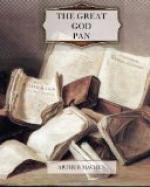Clarke closed the book with a snap, and turned his chair towards the fire. When his friend sat one evening in that very chair, and told his story, Clarke had interrupted him at a point a little subsequent to this, had cut short his words in a paroxysm of horror. “My God!” he had exclaimed, “think, think what you are saying. It is too incredible, too monstrous; such things can never be in this quiet world, where men and women live and die, and struggle, and conquer, or maybe fail, and fall down under sorrow, and grieve and suffer strange fortunes for many a year; but not this, Phillips, not such things as this. There must be some explanation, some way out of the terror. Why, man, if such a case were possible, our earth would be a nightmare.”
But Phillips had told his story to the end, concluding:
“Her flight remains a mystery to this day; she vanished in broad sunlight; they saw her walking in a meadow, and a few moments later she was not there.”
Clarke tried to conceive the thing again, as he sat by the fire, and again his mind shuddered and shrank back, appalled before the sight of such awful, unspeakable elements enthroned as it were, and triumphant in human flesh. Before him stretched the long dim vista of the green causeway in the forest, as his friend had described it; he saw the swaying leaves and the quivering shadows on the grass, he saw the sunlight and the flowers, and far away, far in the long distance, the two figure moved toward him. One was Rachel, but the other?
Clarke had tried his best to disbelieve it all, but at the end of the account, as he had written it in his book, he had placed the inscription:




